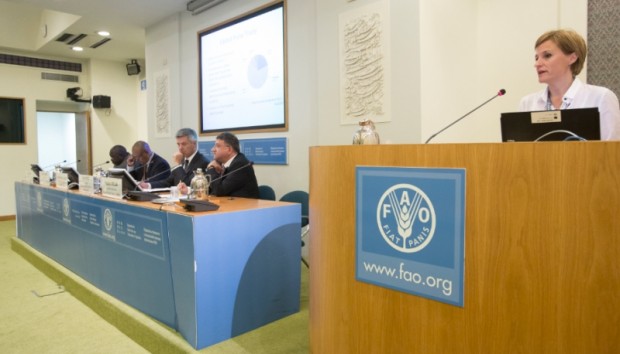ECOSOC at 80: Renewing Multilateralism in an Age of Global Uncertainty
On 23 January, the United Nations Economic and Social Council (ECOSOC) convened a commemorative session…

The International Year of Pulses was highlighted as the Global Pulse Confederation hosted an event at the FAO Headquarter in Rome to draw attention to the importance of trade in pulses around the world. Attended by over 50 people from 27 countries, including many highly influential ambassadors and ministers. Representatives of the World Trade Organisation, FAO, World Food Programme, CropLife, and the Common Fund for Agricultural Commodities were also present. We literally covered the globe including the Philippines, Sri Lanka, Bhutan, Saudi Arabia, Turkey, Germany, Spain, Greece, Netherlands, Mexico, Peru, Argentina, Haiti, Australia, Canada, and USA to name some.
Pulses play an important role in global food security and this was highlighted by the chairman of the day’s event, Minister Plenipotentiary Aseffa of Ethiopia in his opening remarks. Katia Sambin of ACOS then focused on the role of pulses in enabling development, including creating export opportunities as well as fostering local food production. Charles Ogang, President of the Ugandan National Farmers Federation, spoke of the importance of the challenges for farmers, particularly smallholders, to gain access to markets including infrastructure problems and post harvest losses. The challenges of farmers exporting were also highlighted by Gord Kurbis of Pulse Canada who identified the particular need to increase resources to Codex and to improve its efficiency so it can handle issues like MRLs for pulse crops. Huseyin Arslan then spoke about the importance of the International Year of Pulses in the area of market access and all of the theme areas. He made a strong call to action for member states and FAO to act quickly to support the year, including to form the International Steering Committee. Our thanks to all the speakers, and to Pulse Canada for facilitating the event.
The discussion that followed clearly showed that the messages were well received. Questions from the floor raised the question of complementarity of pulses, noting that in many countries consumers had a preference for cereals but that these were often more expensive. Participants also noted the issue of national and regional trade needs to be tackled more actively as many farmers, in particular smallholders, face very high barriers to entry in international markets and their production could instead flow through regional market if integration and efficiency are improved. Several speakers also remarked on the importance of pulses for contributing to initiatives such as the Zero Hunger Challenge.
Immediately afterward, during the Committee on Commodity Problems at the FAO, it was proposed that FAO supplement the existing statistics it collects and provides on pulses. Pending the final outcome tomorrow, it appears we have already had an impact as the Trade and Markets division will now be doing much more regular updates on pulses.
We hope this is the first of many exciting new events regarding the International Year of Pulses.
October 8th Flyer – Tackling Pulse Markets and Stability Invitation (PDF 71KB)
October 8th Presentation – Charles Ogang (PDF 333KB)
October 8th Presentation – Katia Sambin (PDF 416KB)